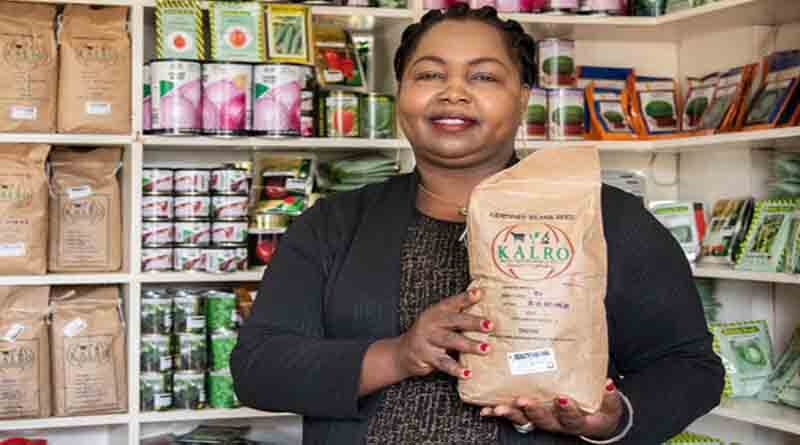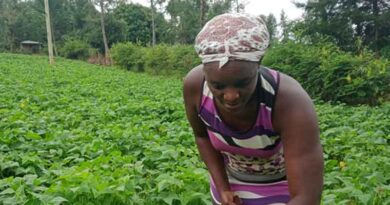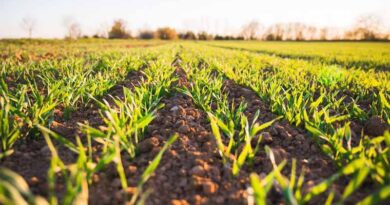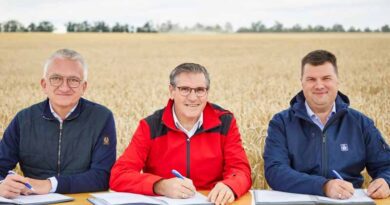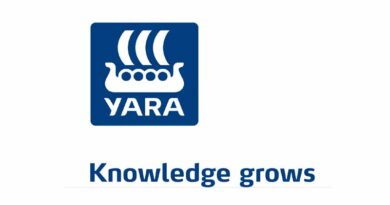Nyota Iron Bean is Kenya’s “Shining Star” for Better Nutrition
08 June 2022, Kenya: Beans are a widely consumed staple crop in Kenya. They provide a ready source of protein and micronutrients for millions of Kenyans whose diets largely depend on plant-source foods for their diets, due to the relatively high cost of foods sourced from animals.
Iron deficiency is also a major challenge in Kenya. It is a leading cause of anemia, which affects an estimated 43 percent of Kenyan children under five years old and 40 percent of pregnant women. To help address this problem, HarvestPlus and its partners have promoted production and consumption of iron-enriched beans, which are scientifically shown to address iron deficiency. They are a sustainable intervention because the beans are readily available to smallholder farming households, and they cost no more than other popular bean varieties to grow. There is also a vibrant post-harvest market for these nutritious beans, which provides a livelihood boost to farmers.
Three varieties of iron beans have been released in Kenya to date: Angaza, Faida, and Nyota (the latter means “star” in Kiswahili). Nyota truly has become a shining star in the bean market, generating strong demand from farmers, seed marketing companies, bean traders, processors, and consumers. Within four years of Nyota’s first seed release in 2017, Nyota grain production had reached more than 50,000 metric tons (MT), or 8 percent of Kenya’s annual bean production. Demand creation campaigns co-led by HarvestPlus with private- and public-sector partners, including the Pan-African Bean Research Alliance (PABRA), have played a major part in scaling this market.
Also Read: Crop Care Federation of India (CCFI) launches latest video on farmer welfare & training programs
Bean multipliers like Nyota for its relatively short maturity (60-70 days), which increases resilience to unpredictable weather conditions. Stewart Burde, a larger seed producer, said Nyota is also high yielding. “It can easily give me over 3 tons per hectare, as compared to other varieties that yield about 2 tons,” he said. “I practice dry planting and zero tillage, and I have found Nyota to efficiently utilize low moisture due to its drought tolerance.” He added that Nyota displays good purity and thus requires far less rogueing—the removal of plants with undesirable growth or other characteristics from the plot. Stewart has planted Nyota on 20 acres and he plans to expand in the next season.
KALRO increases bean seed production
Davis Karanja, national bean program coordinator at the Kenya Agriculture and Livestock organization (KALRO), a key partner in promoting iron bean, said they are investing in production of early generation iron bean seed to support seed companies and help them meet demand from farmers. “In 2022, KALRO aims to supply three times more certified seed (or 500 MT) compared to 2021 as a way of boosting seed availability,” he said.
Under the Government of Canada-funded ENRICH program, HarvestPlus first partnered with KALRO’s research center in Kitale in 2018 to enhance infant and maternal nutrition through consumption of iron bean. Joyce Malinga, Director of the KALRO-Kitale center while ENRICH was active, said the center received 1 metric tons (MT) of Nyota bean seed from the KALRO-Katumani center to kickstart the Kitale center’s own seed production. In the three years through 2021 (the year ENRICH ended), she said 106 MT of Nyota seed was distributed to farmers in Elgeyo Marakwet. “It was a journey of the courageous, considering the complexities of establishing a seed system from scratch,” she said during a meeting with the County Governor of Elgeyo Marakwet.
“The support HarvestPlus provided KALRO to improve on purity of the biofortified seed varieties was timely. It has drastically increased profits among seed companies and thus prioritization to increase investment in their production and marketing,” Karanja explained. He said that in 2021 alone, five additional seed companies were licensed to produce and market Nyota to meet farmer demand.
Since the end of the ENRICH project, KALRO-Kitale has continued to produce and sell various classes of Nyota seed to newly registered seed companies, NGOs, agro-dealer shops, and county governments. Dr. Kezia Ndung’u, Acting Deputy Center Director at KALRO-Kitale, said, “we are not meeting the demand.”
Farmers are also seeing strong demand for their beans, with more than 1 million Kenyan consumers estimated to have eaten this fast-cooking bean variety so far—also much liked for its low-flatulence properties. “In our community, the cost of firewood has more than doubled, and cooking gas has almost tripled in price since 2020. I like Nyota variety because it cooks within almost half the time of the other varieties,” observed Susan Wainaina, a farmer in Nakuru county. Another farmer, Bernard Kirui, noted that “this variety closes its leaf canopy very early, which reduces the number of times a farmer must weed their farm while preserving soil structure.”
Improving livelihoods
Nyota has also improved livelihoods. In 2021, Hellen Keti in Bomet county said the 150 members of her farming cooperative earned a total of more than 3 million shillings (USD 30,000) from their combined bean harvest. “The economy of our community has been strengthened because we spent this [income] within this community,” said Hellen. Seed shop proprietor Lilian Chesire from Elgeyo Marakwet county could not hide her satisfaction when asked about her sales of Nyota seed. “I am not able to meet the [farmer] demand for this variety; my stock runs out very quickly,” she said.
Traders and even higher-income consumers are also clamoring for Nyota. The variety is ably competing with premium bean varieties that have been on the market for a decade or more, in some cases fetching as much as twice the price of varieties that have been on the market far longer.
Since 2019, under the Commercialisation of Bioforitified Crops (CBC) Programme, HarvestPlus and CBC co-lead the Global Alliance for Improved Nutrition have developed a commercial model for iron beans in Kenya, in collaboration with value chain partners. For example, CBC provided Smart Logistics Solutions (SLS), a bean processor in Machakos County, with technical and financial assistance so that it could increase production and generate consumer awareness about biofortified beans.
This support and capacity strengthening has fed into a marketing and distribution strategy for SLS, which includes identification of market segments, securing distribution channels, and conducting demand-generation activities. SLS plans to increase its annual bean throughput to 1,000 MT from the current 200 MT, reaching more than 35,000 low-income households in Nairobi and Eastern Kenya.
As these and other partners take up activities along the Nyota bean seed and grain value chains, the bean is thus delivering on four key impact areas:
- Nutrition as an enriched source of iron, as well as protein;
- Gender empowerment through reduced workload on women due to its shorter cooking time;
- Livelihoods, through increased incomes among value chain actors, including attracting a premium price for seed and grain;
- Climate adaptation as a short-maturity variety that is also drought- and pest-tolerant.
- That said, there is still work to be done to create truly self-sustaining Nyota bean value chains. Further investments are needed in seed production and marketing, farmer support for increased productivity through application of good agronomic practices, and collective aggregation and marketing to meet grain volumes and grain quality/consistency required by traders. While government policies that identify biofortification as a vehicle for improved nutrition exists, work remains to widely implement these policies.

